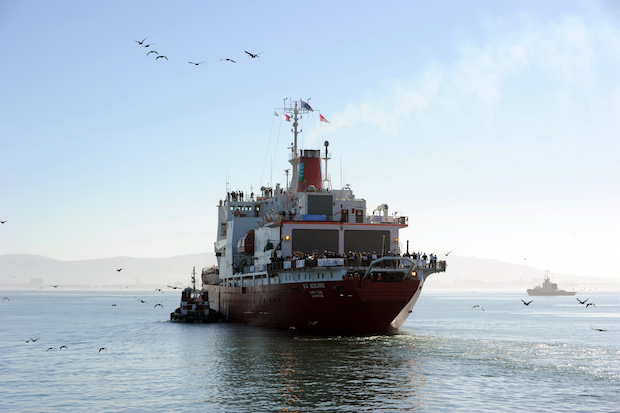Our leaders, of course, love democracy – until it comes up with an answer different to the one they were expecting. Last week, the Natural Environment Research Council (NERC) announced an online poll for the public to vote for the name of a new Arctic and Antarctic-going vessel to replace my ageing near-namesake the RRS James Clark Ross. The outcome will tell us volumes about what public bodies really think of public opinion.
While a few members of the public favoured suggestions such as the RRS (royal research ship) David Attenborough and the RRS Henry Worsley, after the explorer who died in January after coming very close to the end of a solo crossing of Antarctic, the overwhelming favourite so far is the RRS Boaty McBoatface – a suggestion put forward by a former BBC presenter James Hand. At the time of writing it has 10 times as many votes as the next-highest suggestion.
So does that mean that come 2019 scientists will be packing their theodolites and setting sail on the RRS Boaty McBoatface? Don’t bet on it. Neither the NERC nor the universities and science minister Jo Johnson have yet made any pronouncement on the popular choice, but there has already been much huffing and puffing, with Lord West telling the Today programme this morning that he trusts the name will not be the one eventually chosen.
But why not? The NERC didn’t have to ask the public to vote on a name for the ship, but given that it did, it should respect the result. Anything else will be to expose the exercise as a sham – and all-too-typical of the high-mindedness with which government quangos and agencies treat public opinion. They always want our views, but ultimately it counts for nothing if the public want something at variance to a decision which has already been made by a closed committee.
Remember Nick Clegg’s exercise, soon after coming to office in 2010, to seek public suggestions for a piece of legislation to be abolished? It was quietly dropped after a few weeks after the government was overwhelmed with suggestions it didn’t like. In 2004 North Ealing MP Stephen Pound topped the private members’ bill ballot, allowing him to bring a bill of his choice before Parliament. He proudly put it into the hands of Today listeners, describing it a great democratic exercise – until, that is, the public voted for a new law to allow householders to attack burglars with whatever force they chose to. A sheepish Pound then came on the Today programme to announce that his faith in democracy had been shaken: ‘The people have spoken, the bastards,’ he said.
The name of a research ship doesn’t matter much, of course, but a far more serious test in democracy awaits us in June. If Britain votes to leave the EU I have a feeling, whatever David Cameron says, that it won’t really be the end of the matter. The government will flap around for a few weeks and then announce that the EU was prepared to make a few more concessions and perhaps then we’d all like to have another vote. That is, after all, what has always happened before when the people have dared to say no to the EU, in Ireland and Denmark.
I don’t know about the RRS Boaty McBoatface, but the SS Principled Government will go down with all hands lost.







Comments